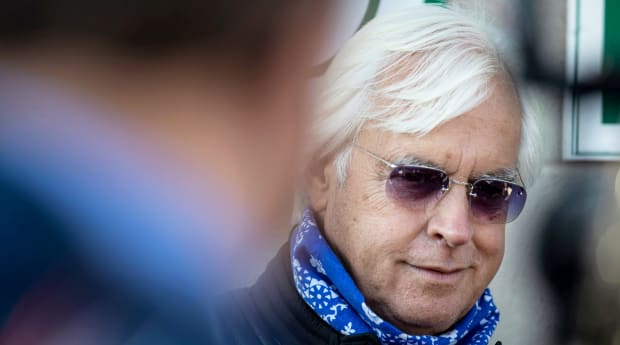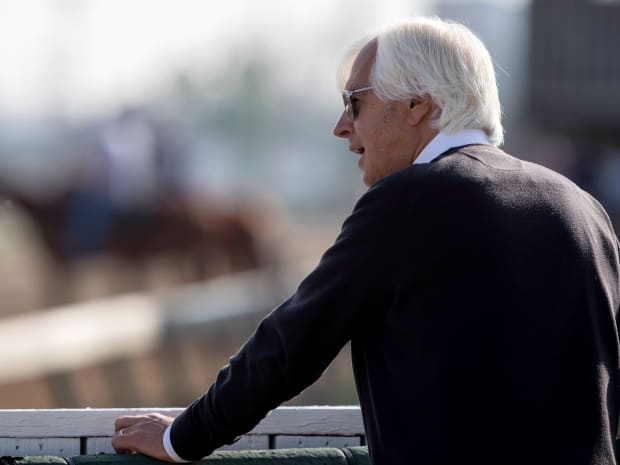Bob Baffert is facing the most damaging drug positive of his career—and, arguably, in the history of horse racing.

The positive drug tests keep piling up for Bob Baffert’s top horses. So do the explanations for them. The dog keeps eating the homework—an entire semester’s worth by now, with permanent damage to the digestive tract.
When it came out that eventual Triple Crown winner Justify tested positive for scopolamine after the 2018 Santa Anita Derby, the result was attributed to naturally occurring jimson weed in the horse’s feed or bedding that was dropped off at Baffert’s barn.
When Charlatan and Gamine tested positive last spring for lidocaine after races on Arkansas Derby day in 2020, the initial rationale was that the substance came from a salon pas patch worn by assistant trainer Jimmy Barnes.
When Gamine tested positive again after the Kentucky Oaks later in 2020, this time for betamethasone, the response was that the medication had been administered as allowed outside the two-week moratorium before a race, but still showed up in the filly’s system.
And now, facing the most damaging drug positive of his career—and, arguably, in the history of horse racing—Baffert hinted that Medina Spirit’s betamethasone positive after winning the Kentucky Derby may be a sinister plot.
“We did not give it to him,” the seven-time Derby winner said at his Churchill Downs barn Sunday morning, eight days after Medina Spirit won America’s biggest race at 12-1 odds. “The vet, no one, has ever treated him with it. This is a gut punch for something I didn't do. It's disturbing. … I don't know what's going on in racing right now, but there's something not right. I don't feel embarrassed. I feel like I was wronged. We're going to do our own investigation.”
Baffert continued: “I do not feel safe to train. It's getting worse and to me, you know going forward, how do I enjoy training? How do I move forward, knowing something like this could happen? It's complete injustice but I'm going to fight it tooth and nail. I owe it to the horse, to the owner and our industry. … These contamination levels—I'm not a conspiracy theorist, I know not everyone is out to get me—but there's definitely something going on. Why is it happening to me?”
Why indeed, Bob? Why is there always a new problem for the most successful trainer in the sport?
At this point, it’s up to Baffert to supply a compelling answer to that question, not the rest of us. It’s his job to convince the world that he’s not what he seems to be. A man who has been a lighting-rod figure in racing for a quarter century has now seen his leaking credibility reach the saturation point. Churchill Downs, which always has welcomed Baffert with open arms, announced Sunday that it has suspended the California-based trainer.

We’ll await the result of Medina Spirit’s split sample. If that comes back positive, it will lead to just the second drug-related disqualification of a Derby winner in the race’s 147-year history, and first since 1968. This one would be much bigger, given Baffert’s place in the game.
While winning 17 Triple Crown races and two Triple Crowns, the former quarter horse trainer has become the sport’s most quotable and recognizable spokesman. The Baffert ride has been wild and fun, one of the most enjoyable things I’ve covered in the business—maybe too enjoyable, causing a suspension of disbelief. I could have asked harder questions.
Now the Baffert ride is bogged down by mounting controversy.
A drug DQ in the Derby may now be the breaking point—for fans, media and thoroughbred owners who send him expensive horses. The pattern overrides the explanations, of which there are many.
Taken individually, there have been reasons to give Baffert the benefit of the doubt.
The jimson weed explanation for Justify’s positive scopolamine test was backed up by several experts when that news first broke in a New York Times story. NBC Sports cited three other Santa Anita-based horses testing positive for the drug around the same time after all received shipments of feed from the same distributor. The deduction was that the weed had gotten into the feed, which isn’t too hard to believe.
The positive tests in Arkansas were upheld last month by that state’s racing commission, but the horses’ disqualifications were overturned, as was Baffert’s 15-day suspension in the state. The commission says the amount of lidocaine in the horses’ systems was too small to present a competitive advantage. Another pass given.
The Gamine Oaks day positive was simply attributed to bad metabolic luck after following the medication rules. And the filly finished a disappointing third in the race anyway.
Now this. Now a potential Derby DQ that is met with a flat denial that the medication was ever used on Medina Spirit. A gut punch indeed, to use Baffert’s own term.
Perhaps, as he seemed to infer, someone drugged the horse or tampered with his sample—but those would be extreme long shots. While there is a vivid history of tawdry dirty tricks at racetracks, it defies belief that any shadowy figure could get to a Baffert Derby horse and inject him with a prohibited substance within days of America’s biggest race.
Ultimately, this very much seems like the same sad song, different verse, when it comes to drug testing and sports. The denials are always vigorous. They are often fanciful. They are rarely compelling.
There have been too many lies under the bridge, into the microphones, from the witness stand and in front of Congress. In our cynical sports world, we are conditioned to believe the following: if an accomplishment (or a body of work) seems too good to be true, it probably is too good to be true.
Nobody hits 73 home runs in a season without assistance. Nobody wins five straight Tours de France. And in a sport like horse racing, which has been haunted by drug issues for decades, maybe it’s simply too much to expect a guy to win a record seven Derbies between 1997-2021 without beating other cheaters at their own game.
Maybe when the seventh win comes with a modestly bred horse who sold for a mere $1,000 as a yearling and just $35,000 as a two-year-old, the progression is beyond the realm of reason. Perhaps the admirably tenacious Medina Spirit could have won the Derby without a prohibited drug in his system. But if the split sample comes back positive, that will be a moot point.
It won’t matter. Bob Baffert will have a disqualified Kentucky Derby winner. It will be the largest and most lasting stain upon the race that matters most, and the trainer who has dominated it for decades.
More Horse Racing Coverage:
• Baffert Suspended After Medina Spirit’s Positive Drug Test
• Wertheim: Heroics. Heartbreak. Murder? This Horse Racing Story Has Everything
• Forde: How Human Rights Became the Talk of a Horse Race